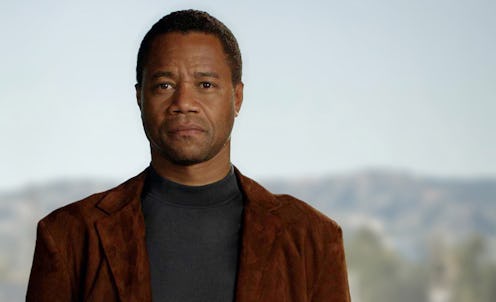Entertainment
'American Crime Story' Isn't About Guilt

There's no show I'm anticipating with more excitement than The People v. O.J. Simpson: American Crime Story. The FX series looks like it will add a compelling prestige drama twist to the true crime craze as it follows the murder trial of O.J. Simpson, who was found not guilty of two murders. But seeking an answer to whether O.J. Simpson killed Nicole Brown and Ronald Goldman shouldn't be the focus of the series. Instead, The People v. O.J. Simpson is about how the trial unfolded the way it did, from the handling of evidence to the media circus that accompanied the televised trial, to the atmosphere of racism that led many people to support Simpson. And to me, that seems like absolutely the right choice.
American Crime Story is based Jeffrey Toobin's book The Run of His Life, which centers on the trial and lawyers involved. By keeping this focus, the series ensures that it will not dwell on Brown and Goldman's gruesome deaths. While American Crime Story doesn't shy away from portraying the brutality of the killings, it also doesn't try to thrill the audience with gory details, which is much more respectful to the victims. The legal focus allows the show to broaden its cast to include fantastic performances from the actors playing dueling lawyers Marcia Clark (Sarah Paulson) and Johnnie Cochran (Courtney B. Vance), who bring their A-game to the material (and while they're my two personal favorites, the series is packed with excellent supporting performances as well).
Plus, with the benefit of hindsight, American Crime Story can take extra pains to set the scene of a tense Los Angeles after the Rodney King riots. That way, when Cuba Gooding, Jr. as Simpson heads out on that fateful Bronco chase, the audience can understand why he's met with cheers, and how the choice to televise the trial wound up being a pivotal moment.
With the focus on those elements, hopefully, the show can manage to avoid the pitfall that tripped up Serial, The Jinx, and Making a Murderer: crafting a mystery so compelling that the audience becomes obsessed with finding an "answer," rather than paying attention to the critique of the American justice system. Since almost everyone watching the series knows that at the end of the trial, Simpson was found not guilty and two years later ordered to pay $25 million in punitive damages to Brown and Goldman's families in a civil lawsuit. There's no reason to pore over minute details in hopes of "solving" the crime. Instead, American Crime Story's criticism comes through loud and clear. What matters here is why Simpson was found not guilty in his criminal trial.
According to the American Crime Story panel at the Television Critics' Association press tour, the show was written without those involved having a firm opinion on whether or not Simpson was really innocent. As critic Todd Van Der Werff points out on Twitter, The Run of His Life did take a stance on Simpson's innocence, which might be why the first few episodes of the series rather heavily imply that Simpson could be, if not guilty, then somehow involved with the crime, by showing the fictionalized representation of Simpson acting erratically. One of Simpson's lawyers from the trial, F. Lee Bailey, still maintains that Simpson is innocent, as reported by ABC's WMTW in 2014.
But after that opening, which I think more accurately captures the fervor surrounding the case than it does conclusively suggest Simpson was guilty, American Crime Story shifts focus to what made this the biggest criminal trial in modern memory. Once the pilot sets up the central story (for those who don't remember it from the news), the show moves from person to person in order to deconstruct what made moments like "if it does not fit, you must acquit" happen. And as the cast points out to E! News (below), there's a lot of information that wasn't broadcast during the trial that American Crime Story dives into.

Sterling K. Brown, who plays prosecutor Christopher Darden, gave E! a particularly detailed insight. "At the time I didn't know whether he was innocent or guilty. But as a young black man, finally I saw the legal system work for 'us,'" he said. "I recognize what I didn't see at that time ... was that two innocent people brutally had their lives taken away from them." The People v. O.J. Simpson: American Crime Story seems to be imitating the same arc Brown went on. Hopefully, it will illuminate for viewers how regardless of who killed Brown and Goldman, in a quest for TV ratings, an obsession with celebrity, and years of unjust treatment of black men, more than a verdict was read on Oct. 3, 1995.
Image: FX Networks